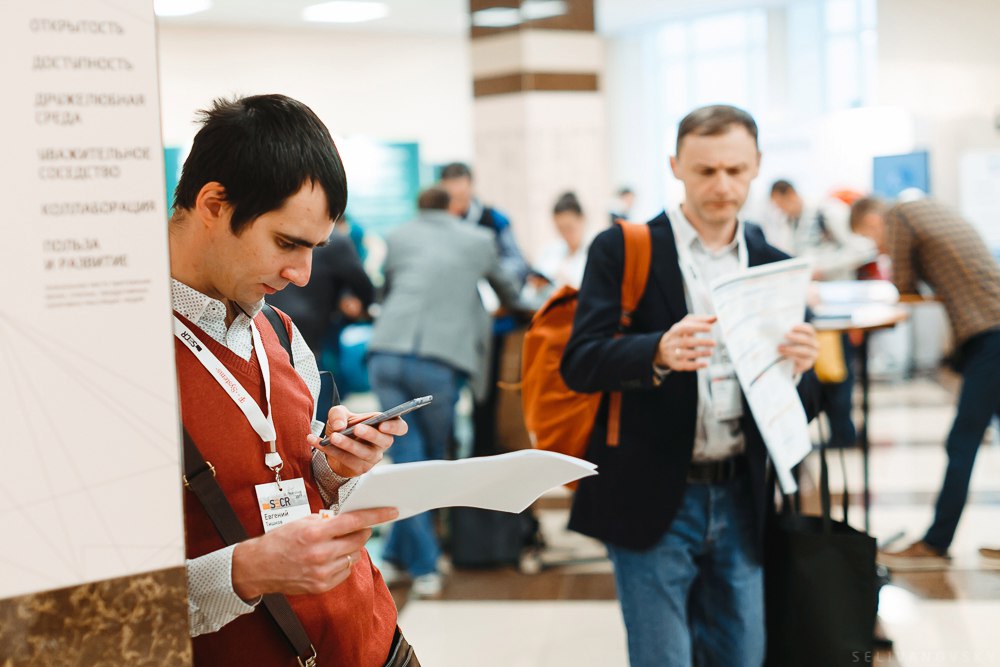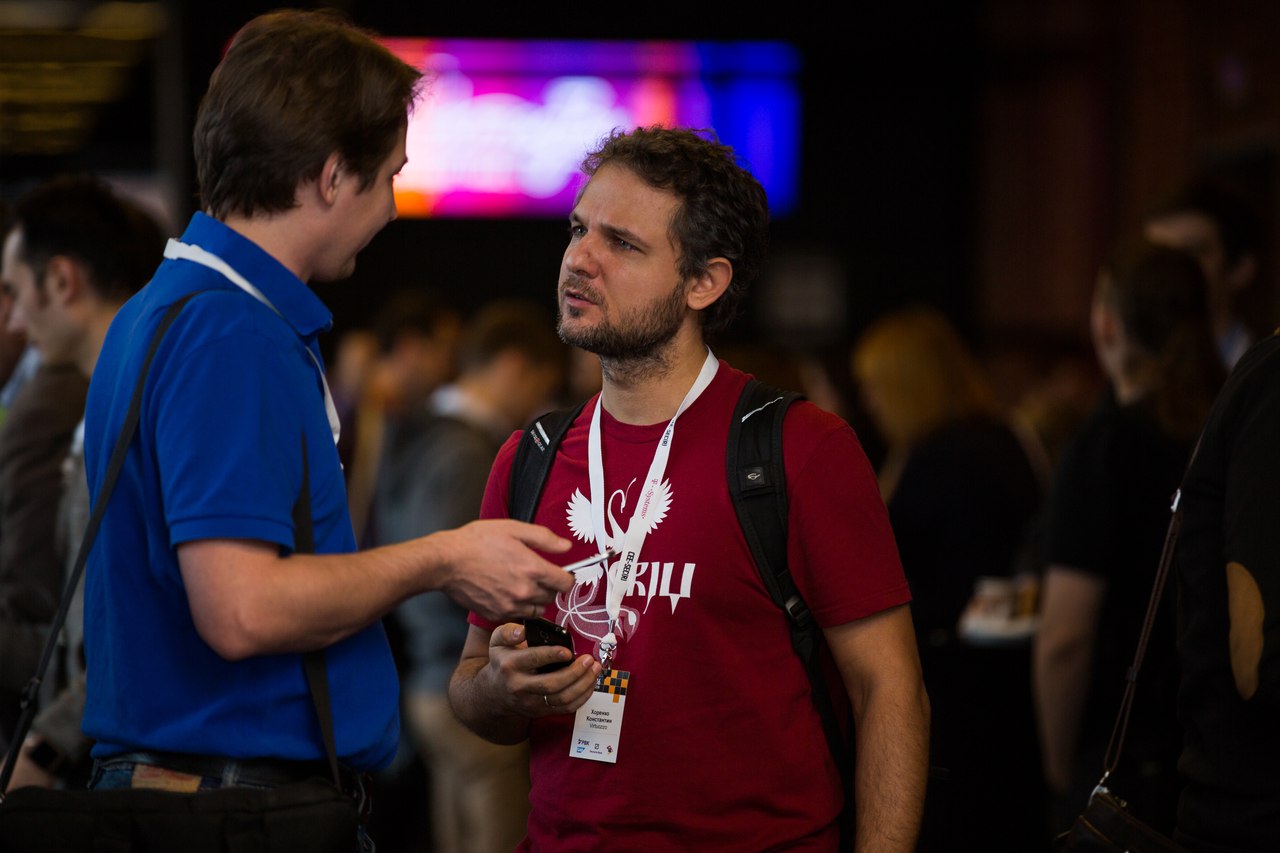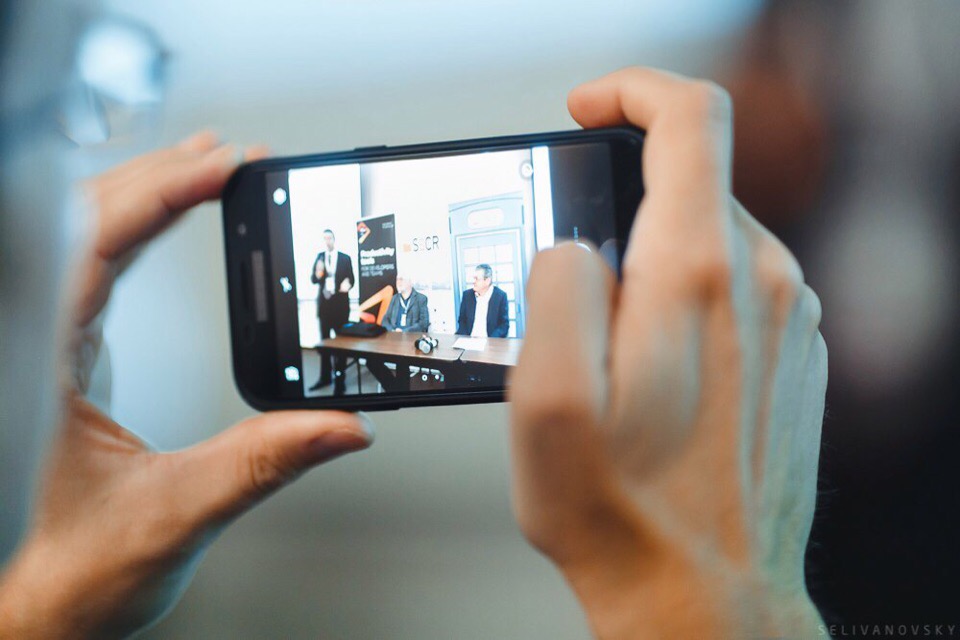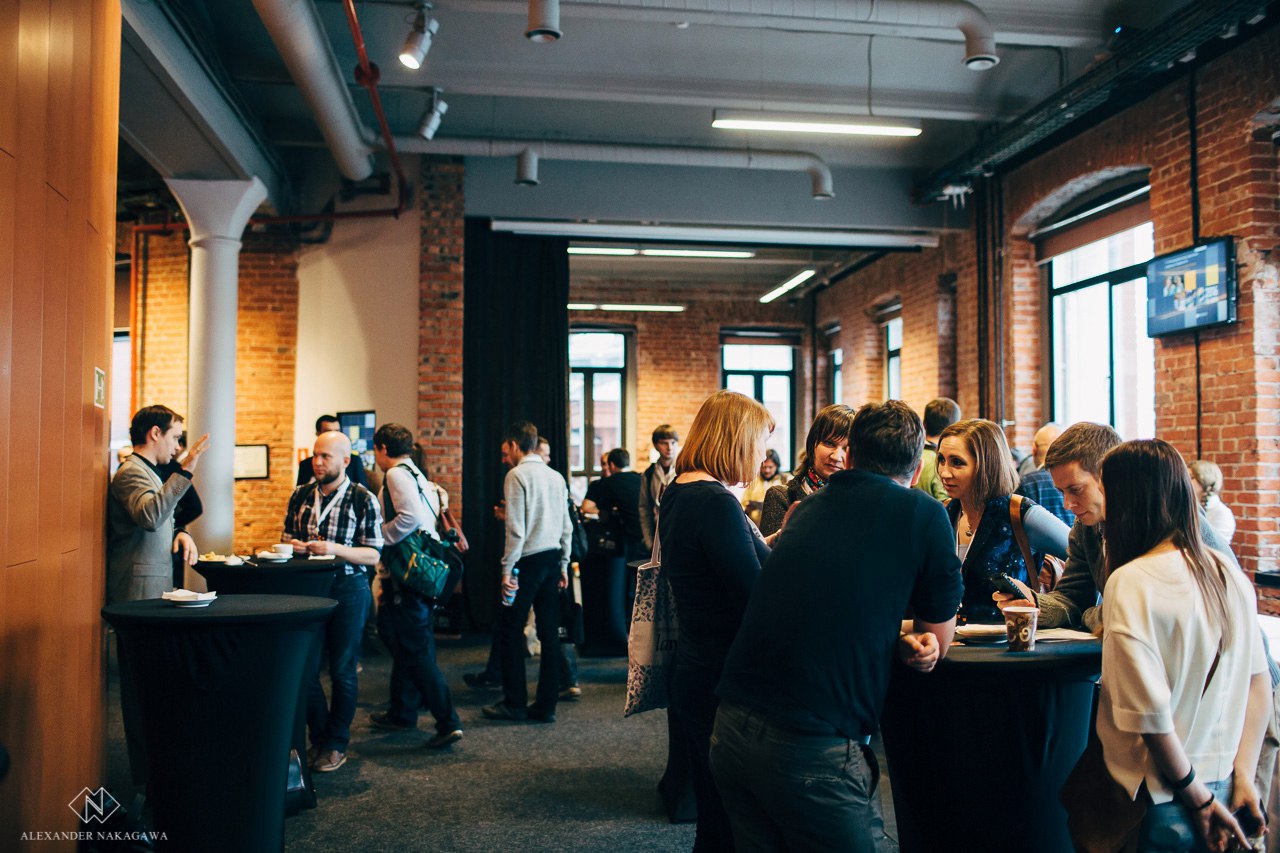How to get the most out of a conference
The question of the benefits and the need to attend an IT conference is often controversial. For several years now I have been participating in organizing several major events and want to share some tips on how to get the most out of the event and not think about the lost day.
If you think that “reports and speakers”, then this is not so. More truly, not only. In addition to the program, it is also a “party” of like-minded people. Like-minded, active and interested in what is happening. Where, if not in such a place, to talk about the profession, discuss cases, projects, the nuances of work. In such lively conversations, completely new ideas are born. Thanks to a change of scenery, new faces, fresh thoughts, the conference is a source of inspiration. And if it also takes place in another city - generally a mini-vacation. And do not overlook the fact that employee participation in the event is a good sign for the employer, which speaks of motivation and the desire to develop in the profession. And merit can directly affect the attitude to the employee, status, even position or salary.
So it turns out that we are going to the conference. And we get:
And in order to get the maximum profit, we must squeeze the full out of each point.
Now, in order about how to do this.
Now large conferences offer several simultaneous tracks in the program. Consider the approach as you make your choice. You can either go to reports on your topic and pump in it, or vice versa choose areas adjacent to the main theme to learn something fundamentally new. You can focus on the subject, or you can focus on the company of the speaker whose experience you are interested in. Do not make a complete schedule, mark in the program only those performances that you definitely can’t miss, put reminders in the phone at the time the performances begin.
If during the report you understand that “it doesn’t go in”, go to another room or go get acquainted in the hall - do not waste time. In order not to disturb others, sit on the side of the aisle. Do not bet on key and invited speakers. If their topic is not entirely close to you, go to another track. Knowledge here is more important than the "starryness" of the speaker.

The speaker spoke, and here the most interesting part begins - questions. Strangers are also useful, but you need to ask your own. Try to think through the questions in advance, because you outlined this report when you made your personal schedule. Here, too, you need to practice, because you need to know how to ask a question.
If in a nutshell: introduce yourself (name, company, position), express your point of view or describe very briefly how things are on your project so that the speaker understands the problem and then formulate the question. Avoid double meanings and use speaker terms. One good question from the listener can flow into a discussion in the lobby and a strong acquaintance. Often, organizers create special communication areas with speakers near each hall, so that the speaker can be easily found after the speech.
Most speakers are ideological and open-minded people. If you started communication with the author, or you received recommendations for your work, find out how you can contact the speaker after the event. So you can ask additional questions later, share the results or continue the discussion already outside the conference.

Good ideas are best fixed right away. To do this, the participant’s bags usually have a notebook and pen, or you can simply use notes on the phone. The event program is full of speeches and communication, so by the end of the day everything you hear can simply mix in your head. There is no sense in presenting reports completely; usually quite quickly presentations of speeches are published on conference sites. They will help to more accurately recall what they heard, if necessary.

Learn about the pre-party. Sometimes participants and speakers gather for small meetings before the event. This is a good opportunity to meet in advance, find a company for the conference, or just spend the evening if you come from another city. It makes sense to look for information about such meetings in the telegram chat rooms of the event, on the pages of social networks. Although such gatherings are often spontaneous, ask the organizers for monitoring. Initiate the meeting yourself using the hashtag. If not pre-party, look for alternative points of informal communication: networking in a mobile application, telegram chat, social networks, etc.
The most original advice :) And yet, live conferences are a great way to make many useful contacts. And by the way, often at the sponsors' stands for business cards they play some cool prizes. If you think that business cards are the last century, consider how to quickly exchange contacts. It is unlikely that this should be a personal phone - it will drown in a sea of similar phone book entries, let there be pages of social networks that are easy to find. In this case, the personal page should immediately talk about your occupation, so that you can easily be identified in your friends lists, and determine who you are if you stumbled upon a profile after a while.

Events are useful not only for information and dating, this is a great opportunity to break out of the daily routine. Look at your notes, remember which reports inspired you. Which of the heard can be realized already next week? Begin to embody the ideas received, not shelving them so as not to lose the received charge.
But it's all about work. If you get a chance to go to a conference in another city or country, have a little vacation. Take time for a walk, take a tour - explore the area!
As the speakers note, a great way to structure the information received is to pass it on to others. Tell your team about the trip, share the most useful that you learned. Take advantage of the presentation presentations that you will receive. And give recommendations on what kind of performances it is best to see fully in the video when they appear.
And bosses will often let go to events if you share fresh knowledge. Make a few presentations - practice your speech, develop material, and perhaps already want to participate in the conference yourself as a speaker, not a listener.

This is the most basic. But if you try to fulfill all the points, participating in the conference will definitely be useful and will become an effective way to gain knowledge, make new acquaintances and advance in your career.
The list, I am sure, goes on. Share what kind of life hacks do you have for participating in events?
To begin with, what is a conference
If you think that “reports and speakers”, then this is not so. More truly, not only. In addition to the program, it is also a “party” of like-minded people. Like-minded, active and interested in what is happening. Where, if not in such a place, to talk about the profession, discuss cases, projects, the nuances of work. In such lively conversations, completely new ideas are born. Thanks to a change of scenery, new faces, fresh thoughts, the conference is a source of inspiration. And if it also takes place in another city - generally a mini-vacation. And do not overlook the fact that employee participation in the event is a good sign for the employer, which speaks of motivation and the desire to develop in the profession. And merit can directly affect the attitude to the employee, status, even position or salary.
So it turns out that we are going to the conference. And we get:
- knowledge;
- party
- vacation;
- inspiration;
- recognition of merits by the employer.
And in order to get the maximum profit, we must squeeze the full out of each point.
Now, in order about how to do this.
1. Set up your schedule in advance
Now large conferences offer several simultaneous tracks in the program. Consider the approach as you make your choice. You can either go to reports on your topic and pump in it, or vice versa choose areas adjacent to the main theme to learn something fundamentally new. You can focus on the subject, or you can focus on the company of the speaker whose experience you are interested in. Do not make a complete schedule, mark in the program only those performances that you definitely can’t miss, put reminders in the phone at the time the performances begin.
If during the report you understand that “it doesn’t go in”, go to another room or go get acquainted in the hall - do not waste time. In order not to disturb others, sit on the side of the aisle. Do not bet on key and invited speakers. If their topic is not entirely close to you, go to another track. Knowledge here is more important than the "starryness" of the speaker.

2. Ask questions to speakers
The speaker spoke, and here the most interesting part begins - questions. Strangers are also useful, but you need to ask your own. Try to think through the questions in advance, because you outlined this report when you made your personal schedule. Here, too, you need to practice, because you need to know how to ask a question.
If in a nutshell: introduce yourself (name, company, position), express your point of view or describe very briefly how things are on your project so that the speaker understands the problem and then formulate the question. Avoid double meanings and use speaker terms. One good question from the listener can flow into a discussion in the lobby and a strong acquaintance. Often, organizers create special communication areas with speakers near each hall, so that the speaker can be easily found after the speech.
Most speakers are ideological and open-minded people. If you started communication with the author, or you received recommendations for your work, find out how you can contact the speaker after the event. So you can ask additional questions later, share the results or continue the discussion already outside the conference.

3. Record highlights / ideas / insights
Good ideas are best fixed right away. To do this, the participant’s bags usually have a notebook and pen, or you can simply use notes on the phone. The event program is full of speeches and communication, so by the end of the day everything you hear can simply mix in your head. There is no sense in presenting reports completely; usually quite quickly presentations of speeches are published on conference sites. They will help to more accurately recall what they heard, if necessary.

4. Meet in advance or prepare for dating
Learn about the pre-party. Sometimes participants and speakers gather for small meetings before the event. This is a good opportunity to meet in advance, find a company for the conference, or just spend the evening if you come from another city. It makes sense to look for information about such meetings in the telegram chat rooms of the event, on the pages of social networks. Although such gatherings are often spontaneous, ask the organizers for monitoring. Initiate the meeting yourself using the hashtag. If not pre-party, look for alternative points of informal communication: networking in a mobile application, telegram chat, social networks, etc.
5. Take business cards or think of an alternative
The most original advice :) And yet, live conferences are a great way to make many useful contacts. And by the way, often at the sponsors' stands for business cards they play some cool prizes. If you think that business cards are the last century, consider how to quickly exchange contacts. It is unlikely that this should be a personal phone - it will drown in a sea of similar phone book entries, let there be pages of social networks that are easy to find. In this case, the personal page should immediately talk about your occupation, so that you can easily be identified in your friends lists, and determine who you are if you stumbled upon a profile after a while.

6. Develop and get inspired
Events are useful not only for information and dating, this is a great opportunity to break out of the daily routine. Look at your notes, remember which reports inspired you. Which of the heard can be realized already next week? Begin to embody the ideas received, not shelving them so as not to lose the received charge.
But it's all about work. If you get a chance to go to a conference in another city or country, have a little vacation. Take time for a walk, take a tour - explore the area!
7. Tell us about what you heard.
As the speakers note, a great way to structure the information received is to pass it on to others. Tell your team about the trip, share the most useful that you learned. Take advantage of the presentation presentations that you will receive. And give recommendations on what kind of performances it is best to see fully in the video when they appear.
And bosses will often let go to events if you share fresh knowledge. Make a few presentations - practice your speech, develop material, and perhaps already want to participate in the conference yourself as a speaker, not a listener.

This is the most basic. But if you try to fulfill all the points, participating in the conference will definitely be useful and will become an effective way to gain knowledge, make new acquaintances and advance in your career.
The list, I am sure, goes on. Share what kind of life hacks do you have for participating in events?
